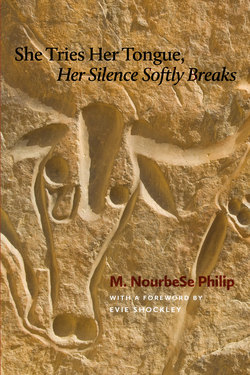Читать книгу She Tries Her Tongue, Her Silence Softly Breaks - M. NourbeSe Philip - Страница 10
На сайте Литреса книга снята с продажи.
Оглавлениеxilocation, we were women “double-imaged / doubly imagined / dubbed dumb,” as Philip writes in “Eucharistic Contradictions,” “with a speech spliced and spiced / into a variety of life and lies.”Philip’s Caribbean and Canadian experiences are not mine, but they will be intimately familiar to some readers. Maybe one such reader is the “Girl with the ying cheek-bones” or the “woman with a nose broad / As her strength”; maybe another is “the man with the full-moon lips /Car-rying the midnight of colour.” Of these African Caribbean readers (and of all “New World Africans” whose roots are in exile), her poetry asks:If not in yours In whose In whose language Am I If not in yours Beautiful (“Meditations on the Declension of Beauty . . .”)It is up to these readers to name her features — our features — with words that carry a positive charge, to makethe English words express the love-liness and desirability of her body — our bodies — in the face of centuries of connotations to the contrary.To her African Caribbean readers, in particular,she asserts in her essay (and I, reading along over here, overhear): “For too long, . . . we have been verbal or linguistic squatters, possessing adversely what is truly ours.” (Yes, Philip’s legal training manifests itself in this volume as in Zong!and elsewhere.) Not only is this fabulously musical, rhythmic,elastic “Carib-bean demotic” your language, she argues — that which Kamau Brathwaite earlier in the same decade had called “nation language,” and which poets like“Miss Lou” Bennett (earlier)and Linton Kwesi Johnson (contempo-rarily) have shown to be so versatile, so ingenious, and so penetrating, as well. But also, Philip insists, the “Queen’s English”is yours by right, no matter how hostile it has been to your (our) humanity, nomatter how dicult the expression of an African(-descended) self may be in thatlan-guage. (African Americans have similarly inherited both the heroic cou-plets of Phillis Wheatley and the best of the Black Arts Movement’s black aesthetics. We might cite Tracie Morris’s twenty-rst-century sound-scape “From Slave Sho’to Video aka Black but Beautiful” as work whose
